I remember legendary Wessex river angler, and 1980s multi-Drennan Cup winner Martin Hooper telling me years ago when I fished with him on the Dorset Stour that he hated the title of his book Specimen Hunting by Design.
The publisher insisted on it so that us punters would know what to expect from it… and would buy it. Martin, forever the romantic, wanted Avon Days and Stour Ways ( or it could have been Avon Ways and Stour Days…my memory is hazy). But as ever is the way, the publisher called the shots.
I was reminded of that title…‘by Design’ when contemplating this article as I sat merrily for a few hours watching pigeons roosting on the Grand Union Canal near Watford. Well they weren’t roosting on the Canal, but you know what I mean.
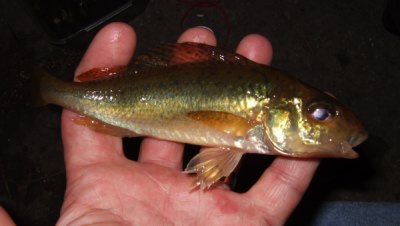 I often go fishing for set species, as do all specimen hunters. And to me those species don’t have to be massive. Take another legendary angler (well to me anyway), Suffolk’s retired farmer Dennis Flack, from Lakenheath, who at one time held no less than four British coarse records at the same time. That’s amazing. Can you imagine the same fisher having caught a near 70 pound true English carp, a 15 pound-plus tench, 22 pound barbel plus another massive fish – let’s say a 20 pound bream or a big four pound roach. Awesome, absolutely awesome and that man, or woman, would have his or her name up in lights for years and would be the king or queen of the celebrity circus. And not necessarily by choice.
I often go fishing for set species, as do all specimen hunters. And to me those species don’t have to be massive. Take another legendary angler (well to me anyway), Suffolk’s retired farmer Dennis Flack, from Lakenheath, who at one time held no less than four British coarse records at the same time. That’s amazing. Can you imagine the same fisher having caught a near 70 pound true English carp, a 15 pound-plus tench, 22 pound barbel plus another massive fish – let’s say a 20 pound bream or a big four pound roach. Awesome, absolutely awesome and that man, or woman, would have his or her name up in lights for years and would be the king or queen of the celebrity circus. And not necessarily by choice.
So did Dennis Flack shun mega publicity, or do we just not give so much credibility and adulation to our mini species, and our mini species catchers? And if not why not?
Well, as Brian Clarke, fishing correspondent of The Times wrote back in 2004: “Dennis Flack is unique among angling’s big names. The sport has its specimen-hunters, its single-species obsessives and its time-and-motion-study matchmen who can produce hundreds of fish at a sitting. But Flack stands head and shoulders below them all.
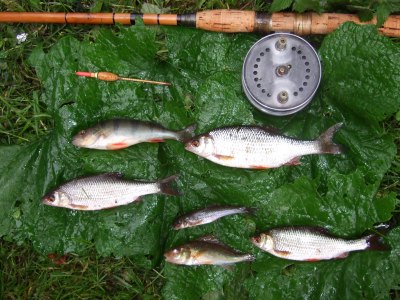 “The retired farmer is Britain’s best-known big little-fish expert — indeed, maybe Britain’s only big little-fish expert. In 1998, the year he peaked, he had the entire angling world looking down to him. He became the first angler to have three record claims ratified in a year, the first to have two claims ratified at the same meeting of the British Record Fish Committee, the first to be credited with four different species records. And what fish they were. In June he banked the biggest three-spined stickleback that mortal man had clapped eyes on — a blockbusting three-incher that weighed seven grams. A month later he had a bruising encounter with a bitterling that came in at 21 grams. Soon after, Flack shook the bleak-fishing world — in truth, not a very big world — with a leviathan of 4oz 4dr. And, of course, ten years before there had been the 15oz silver bream, the fish that started the whole giddy business off and that has seen him racking his sights lower and lower ever since. ”
“The retired farmer is Britain’s best-known big little-fish expert — indeed, maybe Britain’s only big little-fish expert. In 1998, the year he peaked, he had the entire angling world looking down to him. He became the first angler to have three record claims ratified in a year, the first to have two claims ratified at the same meeting of the British Record Fish Committee, the first to be credited with four different species records. And what fish they were. In June he banked the biggest three-spined stickleback that mortal man had clapped eyes on — a blockbusting three-incher that weighed seven grams. A month later he had a bruising encounter with a bitterling that came in at 21 grams. Soon after, Flack shook the bleak-fishing world — in truth, not a very big world — with a leviathan of 4oz 4dr. And, of course, ten years before there had been the 15oz silver bream, the fish that started the whole giddy business off and that has seen him racking his sights lower and lower ever since. ”
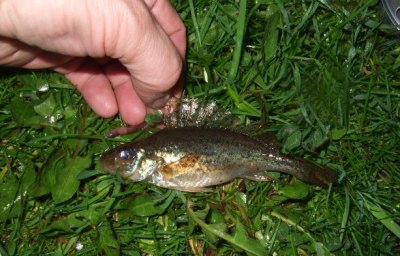 “They’re out there all right, but you’ve got to find them,” he said. “You can’t just drop in somewhere and expect to get a little fish, you know.”
“They’re out there all right, but you’ve got to find them,” he said. “You can’t just drop in somewhere and expect to get a little fish, you know.”
It’s a nice line, but many of Flack’s best fish have actually come when he was fishing for something else, like the 4oz ruffe — record 5oz — that he picked up shortly before Christmas 2003. “I’ve had quite a few of them by design, but it is interesting how many have come unexpectedly,” he said.
Said Dennis: “The truth is, I think the same thing happens to others. I think lots of anglers catch big little fish and don’t really know what they’ve got. They’re just not interested the way I am. I know what these fish are and I claim them because the way I see it, a record fish is a record fish, no matter how big or small it is.”
Summing , up Clarke in The Times, added: “Flack, a one-time big-circuit matchman and a crack all-round angler, has a wry sense of humour. He rejoices in the niche he has carved for himself and hams his little fish up — “heavy on the shoulder and very deep” — as well as any pike man or carper. Talking to him is a bit like talking about McGonagall and his poetry, or that woman who had a voice like a screech owl yet who played to packed opera audiences: you never quite know who is taking whom for a ride — or even if a ride is involved.”
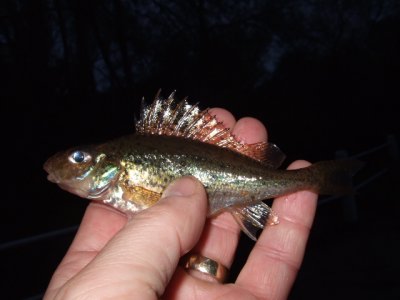 And that’s the point, we all get our angling enjoyment in different ways. From three rods Jace in one of my previous storylines who camps out for days on end, walks his wheelbarrow three times round the lake to his swim and lugs a 24-pack of Fosters to his bivvy before spodding out a mountain of muck. But he is successful in his quest for carp. He’s a happy camper. And a happy carper. He’s only unhappy when a slimy 10 pound bream intercepts his bait, or a wonderful six pound tench (a super specimen for our water..and you can only catch what’s available to catch). So generally he is happy, just as Dennis Flack was. And as I am in my fishing and with my results – especially on my last outing when I set out to catch Ruffe…by design! That meant fishing on the marginal gravels, fishing light, and using maggot or small worm hook baits. Of course I caught gudgeon and some modest roach… but Little Tommy Pope also showed. Magic. Pure magic.
And that’s the point, we all get our angling enjoyment in different ways. From three rods Jace in one of my previous storylines who camps out for days on end, walks his wheelbarrow three times round the lake to his swim and lugs a 24-pack of Fosters to his bivvy before spodding out a mountain of muck. But he is successful in his quest for carp. He’s a happy camper. And a happy carper. He’s only unhappy when a slimy 10 pound bream intercepts his bait, or a wonderful six pound tench (a super specimen for our water..and you can only catch what’s available to catch). So generally he is happy, just as Dennis Flack was. And as I am in my fishing and with my results – especially on my last outing when I set out to catch Ruffe…by design! That meant fishing on the marginal gravels, fishing light, and using maggot or small worm hook baits. Of course I caught gudgeon and some modest roach… but Little Tommy Pope also showed. Magic. Pure magic.
I had no less an enjoyable time when I took a Richard Walker designed, Joe Emmens of Sheffield built and B James of Ealing whipped 14ft Spanish reed and Tonkin tipped 14ft Sheffield style float rod to the canal with Mate Mike and sat in a February snowstorm to catch 20 gudgeon. We laughed like school kids, though in truth we were 103 at the time (that’s combined ages).
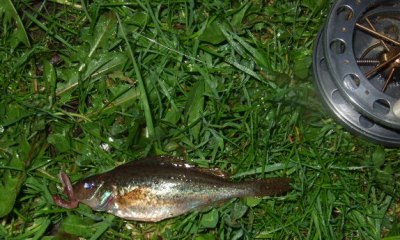 Admittedly, Dennis confesses to catching some of his fish unexpectedly…but doesn’t it make you wonder just how many big record little fish are out there.. sticklebacks, though they seem rather rare these days, minnows, gudgeon, bleak, and the somewhat rarer bullhead and stoneloach.
Admittedly, Dennis confesses to catching some of his fish unexpectedly…but doesn’t it make you wonder just how many big record little fish are out there.. sticklebacks, though they seem rather rare these days, minnows, gudgeon, bleak, and the somewhat rarer bullhead and stoneloach.
In the recently published wonderful little book The Little Book of Little Fishes (Medlar Press, 2008, presented to me my Mate Mole, Wessex roach King Dr Mark Everard sets out with young daghter Daisy and mate Sid to locate and catch a ruffe in The Great Ruffe Hunt (with capital letters). Daisy is first to latch into the splendid little Tommy and, says Dr Mark: “So ended the Hunt. It was a continuing reminder of how great small fish can be, of the pleasures that might unfold unexpectedly, like vivid rose petals from a tight bud, on discovering a new and hidden face of a venue that one might more often overlook. So the sun set on a fantastic day of good company and good sport.” And he meant it. If like me and Mole you are interested in small fish, go buy the book. It’s a must read.
So if only we brothers of the angle could be bothered, had the inclination…the venue knowledge or, even, dare I say it, the watercraft skills…. we might really enjoy a little bit of small fish fishing, without humping three tonne of gear to the waterside
Gary Cullum













